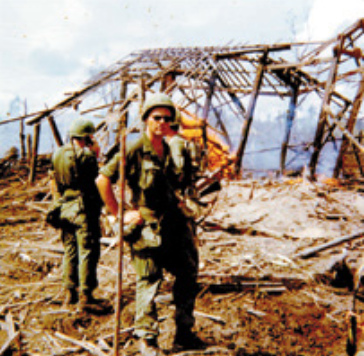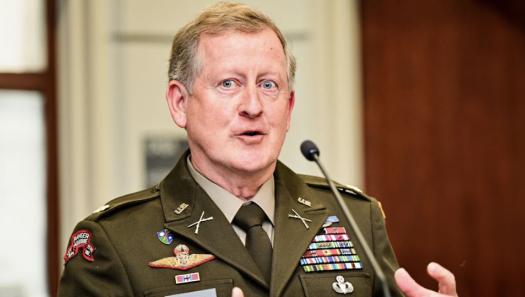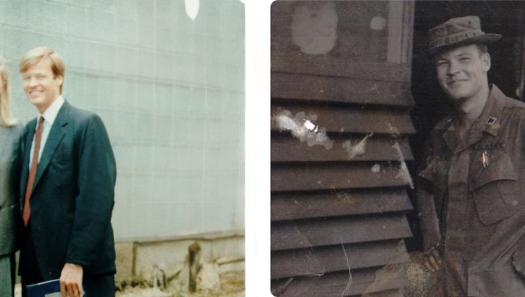WeSalute Awards
Jack Farley, Teaching Young People About War’s Lessons
Bernard Edelman

On 6/6/66, John J. Farley III learned what he looked like in khaki and olive drab. He was not displeased with what peered back at him in the mirror.
He had been working toward his master's degree in business administration at Columbia University when his draft board on Long Island tried to induct him. "They were good about it, though," Jack Farley said. "They let me finish school and I "volunteered.' It was what was known as an "encouraged enlistment.'"
Two years later, 1Lt. Farley found himself halfway around the globe, owned by the 1/8 Artillery, 25th Infantry Division, and assigned as a forward observer—call sign "Killer 54" – to Company D, 2/27 (The Wolfhounds). Over the next nine months, few days or nights would be without the potential for hazard.
An idyllic calm could be shattered in an instant.
At an outpost along the Saigon River one day, Farley was shooting the breeze with several Wolfhound grunts. "The six guys left on a small Boston Whaler to go out on patrol," he recalled during a telephone conversation from his chambers in Washington, D.C. "Before they got 200 yards, a rocket-propelled grenade hit their gas tank. Less than ten minutes after we'd been talking and laughing, we were pulling their totally charred bodies out of the water."
That may have been the most gruesome day Jack Farley experienced. Until January 10, 1969, that is.
Farley was the battery exec at Fire Support Base Pershing when "Charlie hit us with 82mm mortar fire. One round exploded next to base piece "within gimme range of me,'" he said. Shrapnel peppered his body. "I remember flying through the air. My glasses flew off and I reached out for them and grabbed "em before I landed. I crawled five feet to the parapet. A medic peeked his head over and asked me if I was okay. I remember clear as day thinking, "What would John Wayne say?'
"'Doc,' I told him, "go look after the other men.'"
This time, however, John Wayne would have been wrong because Farley was the only one who'd been hit. Egregiously so. As he wrote to his father a few days later, it "took five pints to get [a] pulse."
Learning to Walk
Jack Farley returned from Vietnam with four Bronze Star awards, three with "V" device, the Army Commendation Medal, a pair of Purple Hearts, and a shattered body. He would spend 14 months at Walter Reed Army Medical Center recovering from his wounds and learning to walk all over again: his right leg had been amputated above the knee.
No, he wouldn't be playing any more lacrosse, the sport he had come to love and at which he had excelled. He had been All-Scholastic in high school, and captain of the freshman and varsity lacrosse teams at the College of the Holy Cross, from which he received his undergraduate degree in economics. At one point, as the realization began to sink in that the parameters of what he could do had narrowed and that he would never run again, he became very upset. Almost instantly, however, he recalls a little voice telling him, "Farley, you never could run anyway!"
Recovery had begun.
Still, he knew he was lucky to be alive. The physical wounds he could handle. The collective national attitude, however, rankled.
"Nobody cared," he said. "Nobody wanted to hear what it was about." Soldiers like Farley had fought and bled and the country, convulsed over the rectitude of America's pursuit of the war in Southeast Asia, did not embrace returning veterans. Which hurt many, perhaps, as deeply as their wounds.
Lying in his bed at Walter Reed, having been told that he was now 100 percent disabled, Jack Farley knew he had to come to terms with the altered state of his physical self if he was to lead a productive life.
Cum Laude
Determined not to look back, Jack reasoned that he would have more control over the course of his life if he were to master a profession. After retiring from the Army as a captain in 1970, he got married and went to the School of Law at Hofstra University. He was the founding editor-in-chief of the Hofstra Law Review, graduated first in his class, and earned his Juris Doctorate, cum laude, three years later.
He went on to a 17-year career as a litigator with the Department of Justice, rising to become the director of the Torts Branch in 1980. When the new United States Court of Veterans Appeals (since renamed the United States Court of Appeals for Veterans Claims) was created in 1989, he was nominated by President George H. W. Bush and confirmed by the Senate as one of its first judges.
He has been there ever since, as the accolades acknowledging an honorable life continued piling up.
He received the Distinguished Alumni Medal from his alma mater, Hofstra, in 1986. A decade later, he was accorded the Dean's Award for Distinguished Hofstra Law School Alumni. In 1997 he was elected to the Board of Directors of the Amputee Coalition of America. In 1999, he was inducted into the Massapequa High School Hall of Fame.
Sharing the Lessons Learned
What he had seen and done as a soldier in Vietnam, as an instrument of national policy, would not stay dormant, neatly filed in a side drawer of memory. So Jack Farley, who lives in Bowie, Maryland, with his wife and the youngest of their four children, would venture forth to elementary and high schools and talk to young people about the meaning of war and the fact that, as the Duke of Wellington said, "The next dreadful thing to a battle lost is a battle won."
With the blessing of ski buddy Hal Moore, Farley borrows from the brilliant introduction to the book General Moore wrote with Joe Galloway, We Were Soldiers Once . . . And Young, and tells them that while individual acts of bravery and courage are daily events, war is an "awful, bloody, destructive business." It is miserable. It is horrible. It all too often shows us the inhumanity we humans are capable of. Of his war, he has no use for the "body count," that artificial means used to gauge if not to inflate an illusory success on the battlefield.
At times, however, war is necessary. Yet the reason to fight must be "vital to the society because of the tremendous and terrible price those who fight and those who die must pay," he says. He reviews the citizen-soldier tradition in this country, "how we drop our plows and blacksmith hammer and go off to war. Succeeding – beating the enemy – can be a high even as it tests our limits. But while the vast majority of those who fight return home to pick up the plow and work in the fields again, some are never able to: the war has changed them."
Farley points our that one of the commemorating events of the 20th anniversary of the Vietnam Veterans Memorial on Veterans Day 2002 will be the reading of the 58,000-plus names of those who were lost to the war. "That is how it should be," he says, "because the names of the dead are the real force, the real lesson of "The Wall' for future decision-makers."
He also notes that those who decide that others should fight do not themselves engage in battle. Given the huge cost of war in terms of lives, limbs, and psyches, he urges students not to forget the human toll of battle should they become the decision-makers and have to decide whether a war is necessary and wise.
Elite Fraternity
As one who has suffered the loss of a limb, Jack Farley is a member of an elite fraternity. Overcoming his disability, he has become an avid golfer and skier. And he assists other disabled veterans by teaching them to ski, serving for the past twelve years as a volunteer instructor at the VA/DAV Winter Sports Clinic.
While in Utah on a case in 1982, he was "invited" by a friend, Judge Dan Maus, to learn one-legged skiing. After five years of sweat and lessons at Winter Park and Steamboat Springs, he said, "It finally clicked. I got very good and very fast."
Skiing soon became a family affair.
A dozen years ago, while on a family vacation in Snowmass, Colorado, he noticed "all these disabled guys skiing." Used to being "the only gimp on the hill," Farley had "stumbled" onto the third annual Winter Sports Clinic for disabled veterans conducted jointly by the VA and DAV. He was invited to join the clinic, was awarded his gold medal as a participant, and, when he received a letter a few months later asking if he would like to join the clinic cadre of 180 volunteer adaptive ski instructors, he found it hard to say no.
"I've taught vets from World War II through Desert Storm, Somalia, and Bosnia," he said. When confronted with the reality of a traumatic disability, "some vets react better than others. Most people accommodate their disability; some, though, are weighed down by it.
"Today we can adapt equipment so that the only limit you face is gravity. Whether sitting in a monoski or standing on one ski and using outriggers, you can be as fast and as free as anybody else on the slopes," he said. One veteran in particular, a naval ensign who lost both legs below the knee in an accident in August 1999, "was skiing with us the following March and, when he returned the following year, he was an expert. Watching him ski, you'd never know he was disabled. And he isn't!"
For Jack Farley, to be an enabler of such a life-enhancing experience "is just an unbelievable thrill. It's the highlight of my year."


